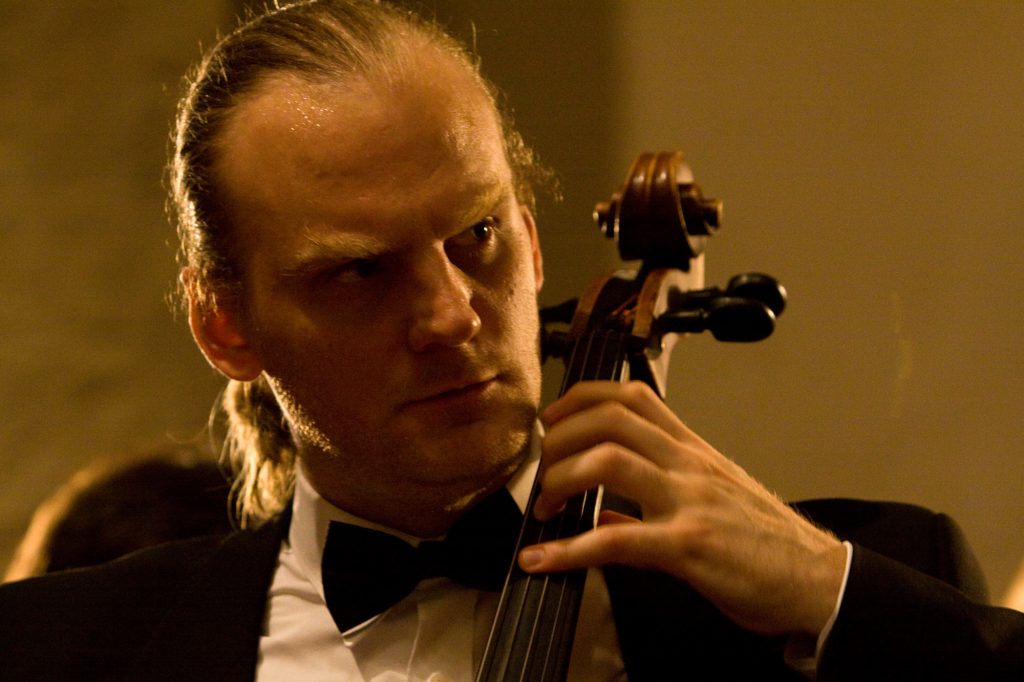
Czech cellist František Brikcius was born in Prague. He studied at the Prague Conservatoire, the Janáček Academy of Music, the Toho Gakuen Academy in Japan and the United Kingdom. He has been awarded many scholarships and fellowships, including the Czech Music Foundation, the Ministry of Culture of the Czech Republic, the Music Foundation OSA and the Gideon Klein Foundation for the propagation of works written by Jewish Holocaust Composers.
František chose to dedicate his life to the interpretation of cello compositions written by composers of the 17th, 18th, 19th, 20th and 21st centuries, giving special consideration to compositions for solo cello. Together with his sister Anna Brikciusová, he is a founder member of the “Duo Brikcius”. He is artistic director of FESTIVAL BRIKCIUS – Chamber Music Concert Series in Prague, BACH FESTIVAL GERS in France and WALTHAM FOREST CELLO FEST in London.
As a soloist František has performed at many festivals in Algeria, Austria, Belgium, Bosnia and Herzegovina, Bulgaria, the Czech Republic, France, Germany, Israel, Italy, Japan, Liberland, Pakistan, Poland, Russia, Serbia, Slovakia, Sweden, Turkey, Uzbekistan and the United Kingdom.
František has been teaching cello for many years. He is experienced at taking students at all levels, able to give master classes as well as support beginners. He is giving cello master classes in the United Kingdom, France, Italy and remotely online via Zoom/Skype. Accepting new cello students now. All ages and abilities are welcome!
Served as a jury member in various competitions including the Berliner International Music Competition in Germany, the Music and Stars Awards, the Music International Grand Prix, the Sound Espressivo Global Competition, the Palm Beach International Music Awards, the King’s Peak International Music Competition and the Baku International Cinema Festival in Azerbaijan.
Legendary cellist Prof. Anna Shuttleworth (student of Pablo Casals) is the teacher who influenced me the most. There are several reasons, all of them mentioned in her Memoirs (2014).
My philospohy of teaching is focusing on both technical and musical aspects of cello playing.
There are several important achievements in my carreer. One of them is music documentary film MAKANNA, based on the novel of the Jewish writer Jiří Weil (1900 – 1959), from the concert performance of the ballet MAKANNA, composed by composer Irena Kosíková for voice (Jan Židlický), solo cello (František Brikcius) and orchestra (Jan Talich – conductor, Talich Chamber Orchestra), was held at the Convent of St Agnes of Bohemia under the auspices of Sir Tom Stoppard and Václav Havel. It’s about the rise and fall of the 7th century false prophet with his face covered with the green veil and his eyes glowing as embers. It was already screened in the Czech republic, China, Mexico, Portugal and the United Kingdom. I’m currently working on new music documentary film eSACHERe (2021).
Organist Irena Kosíková (CZ, France) with her fantastic performance of organ music by Johann Sebastian Bach is my favourite performer.
If I had to choose a humanitarian project I would definitely do Médecins sans frontières (Doctors Without Borders). Our FESTIVAL BRIKCIUS – Chamber Music Concert Series in Prague is regularly organise various charity concerts for this international, independent medical humanitarian organisation. You can support the MSF here: https://www.msf.org/ .
I would bring no CD’s on a deserted island. But I would bring there my “George Kriwalski” cello made in 1904 and pile of cello music sheets. Specially by Johann Sebastian Bach, Max Reger, Ernest Bloch and Benjamin Britten. Together with cello music by Czech (Antonín Dvořák, Leoš Janáček, Bohuslav Martinů, Josef Suk and Irena Kosíková), Jewish & Terezín (Gideon Klein, Erwin Schulhoff, Zikmund Schul, Jaromír Weinberger, James Simon and David Popper) and contemporary composers (Conrad Beck, Luciano Berio, Pierre Boulez, Benjamin Britten, Henri Dutilleux, Wolfgang Fortner, Alberto Ginastera, Cristobal Halffter, Hans Werner Henze, Heinz Holliger, Klaus Huber and Witold Lutoslawski).”
